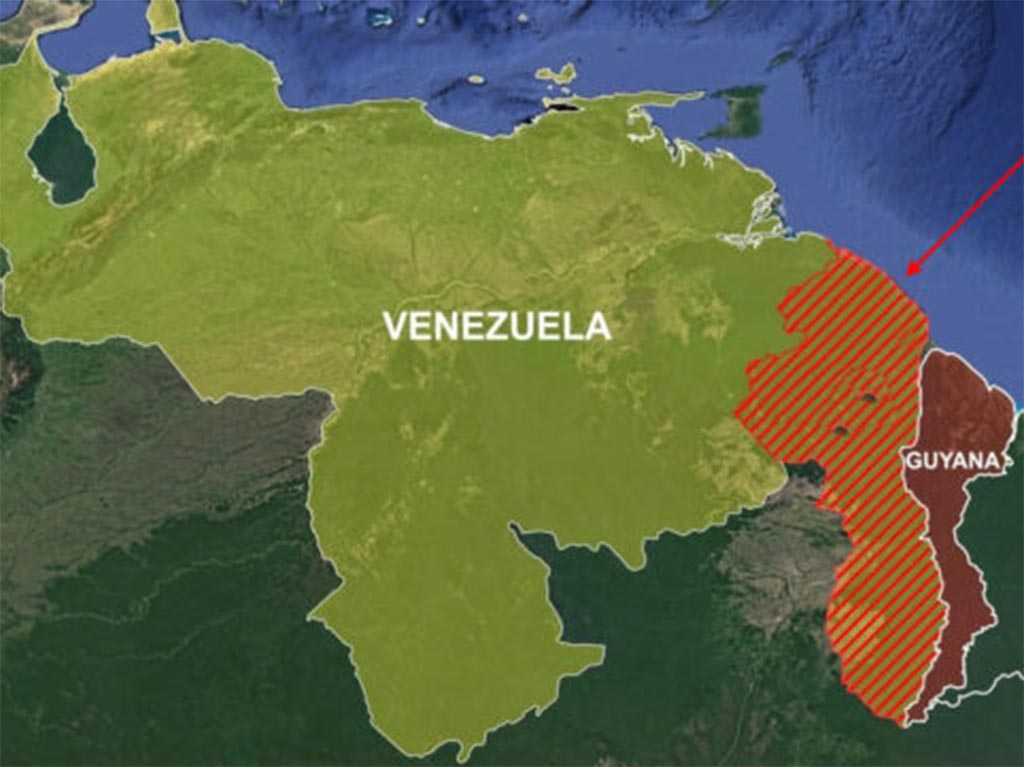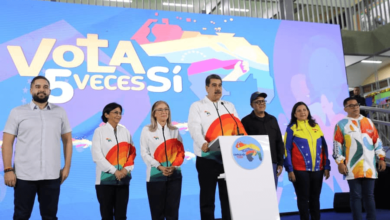Photo: Nicolas Maduro gets ready to vote on Essequibo region. Credit: X/TeleSur English.
Last Sunday, Dec. 3, the Venezuelan people voted overwhelmingly in a national referendum to affirm the sovereignty of their country over the disputed Essequibo region. The referendum is the result of an ongoing land dispute between Venezuela and Guyana over the region. Though some may see this dispute as between two neighboring Caribbean countries, the facts point to it being a struggle between two formerly-colonized peoples and one of the most powerful oil companies in the world — ExxonMobil. The company, which has had long-standing ties with the U.S. government — including Rex Tillerson, who left the company in 2017 to become the U.S. Secretary of State under President Trump — made a record $55.7 billion in profit just last year.
ExxonMobil’s aggressive stance is due to the backing of the U.S. government, which has interfered in Guyanese internal politics to heat up the dispute as it builds its military presence in Guyana. Washington has financed the strengthening of that government’s military in recent years. Since 2022, the U.S. army has engaged in several military exercises with the Guyana Defense Forces.
After the referendum, Venezuelan President Nicolas Maduro said: “Today, there are no winners or losers, the only winner is Venezuelan sovereignty and the loser is Exxon.”
On Dec. 3, the people of Venezuela voted for their right to solve disputes between Latin American countries without the meddling of multinational corporations that only want to plunder the resources of the region for their own benefit. President Maduro affirmed the referendum as an expression of Venezuela’s right to self-determination and not of enmity against the people of Guyana.
The referendum contained five questions regarding Venezuela’s sovereignty over the Essequibo. Voters’ approval ranged from 95.4% on Question 3 (“Do you agree with Venezuela’s historical position of not recognizing the jurisdiction of the International Court of Territorial Justice to resolve the territorial dispute over Guayana Essequiba?”) to 98.11% on Question 2 (“Do you support the Geneva Agreement of 1966 as the only valid legal instrument to achieve a practical and satisfactory solution for Venezuela and Guyana regarding the controversy over the territory of Guyana Essequiba?”).
Over 10.4 million Venezuelan citizens voted.

Map of Essequibo region between Venezuela and Guyana. From prensa-latina.cu.
The Geneva Agreement of 1966
While the issue of the Essequibo has its roots since the 1800s, in 1966 the governments of Venezuela, Great Britain, and soon-to-be independent Guyana signed the Geneva Agreement, which recognized the existence of a dispute over sovereignty in the Essequibo territory and sought to establish the procedures for a peaceful solution to the dispute in accordance with the Charter of the United Nations. Since then, the governments of Venezuela and Guyana have upheld the terms of the agreement and maintained friendly relations that have benefited both countries. In 2009, Guyana joined the PetroCaribe agreement, obtaining Venezuelan oil in exchange for rice, one of Guyana’s main exports.
But this agreement would break down in 2015, as the administration of Barack Obama worked to destabilize Venezuela. On March 9, 2015, Obama declared Venezuela to be an “unusual and extraordinary threat” to U.S. national security. That declaration has since provided the basis for the severe U.S. sanctions against Venezuela.
Soon, tensions over the Essequibo dispute deepened. And as we will see, one of the main agitators in the dispute was neither Venezuela nor Guyana.
The oil is ours
In 2006, under the slogan “El petróleo es nuestro” (“The oil is ours”), then-president Hugo Chávez started the process of nationalizing the oil industry in Venezuela to finance the country’s development. While most multinationals operating in the country accepted the new terms and regulations, ExxonMobil not only refused, but demanded compensation for the tens of billions they would lose by sharing their profits with the actual country whose oil they were extracting. In 2014, ExxonMobil even brought their claim before a World Bank arbitration tribunal, which ordered Venezuela to pay the company $1.6 billion of the original claim.
The plunder of the Essequibo
In 2015, under CEO Rex Tillerson, ExxonMobil started exploring the coastline of the disputed territory. On Feb. 26 of that year, Venezuela demanded that Guyana and ExxonMobil stop their activities in the area. In spite of Venezuela’s demands, on March 5 Guyana installed an offshore oil platform in the Stabroek Block, a 6.6 million acre oil field on the seafront of the Essequibo territory. The platform is operated by ExxonMobil. Then, on May 7, Guyana announced that ExxonMobil had made a “significant discovery” in the block, with recoverable reserves of 500 million barrels. Since then, Guyana has identified more than 5.5 billion recoverable barrels.
A finding of this magnitude would be a boon for the Guyanese economy — and its people. There is only one problem: the secretive agreement between the government of Guyana and the oil giant was hugely lopsided. The agreement not only exempts ExxonMobil from any taxes, it only grants Guyana 50% of any money that’s left over from the 75% of all oil revenue that’s guaranteed to the company. What’s more, a stipulation in the agreement prevents the Guyanese government from altering the terms of the agreement without the consent of ExxonMobil, in essence forcing any future governments into a deal that mostly benefits ExxonMobil at the expense of the Guyanese people and the territorial integrity of Venezuela. Thus, in a tale as old as colonialism, a multinational corporation with ties to the imperial hegemon has free reign to continue to plunder resources in a disputed territory, stoking tensions between two formerly friendly nations in the Global South.
While any military escalation currently seems unlikely, and with the U.S. overextended on other fronts of its imperial aggression, ExxonMobil seems determined to continue its plunder of the Essequibo, no matter the political or economic cost to the Venezuelan and Guyanese people. But for that same reason the referendum of Dec. 3 is so significant: the people of Venezuela made it clear that they do not see this as a conflict between Venezuela and Guyana, but a conflict between two Latin American peoples and ExxonMobil.




